Escalating Crisis in Eastern Congo
Syllabus: International Relations [GS Paper-2]

Context
The situation in eastern Congo worsens as fighting intensifies, and there are allegations that Rwanda is aiding the M23 rebels, causing additional worries about the humanitarian crisis.
Key Points
- The conflict is making the humanitarian crisis worse in the area, as there are more deaths, people being forced to leave their homes, and increased concerns about access to food.
- The United Nations and some Western countries criticise the attacks and call on the M23 rebels to stop their offensive.
Details about the Crisis
- The conflict that occurred in the east of the Democratic Republic of the Congo had its roots in the year 1994 when the atrocities were committed during the Rwandan crisis.
- About three hundred and sixty thousand were Rwandan refugees, and they sneaked into the east Congo which was already at its edge with its host people.
- By doing this, the mightiest nation on the continent of Africa has somehow got into a conflict with the militias of Tutsi and the Congolese rebels, who were supported by Rwanda and Uganda.
- The government was ousted in 1997, while former president Joseph Mobutu was forced to flee the capital, which was renamed Kinshasa, the capital of the democratic republic.
- The Second Congo War, which is locally referred to as “Africa’s world war” started in 1998, in which new armed groups came to light to include the Rwanda backed rebel army.
- Such violence and the deaths that come with it has been a problem for the region despite multiple peace agreements. This has made the partner a deadliest conflict since World War II.
Reasons for the recent escalation of violence in Eastern Congo
- This conflict began after the Rwandan Genocide witnessed in 1994 that brought in more refugees to the east of DRC.
- Consequently, the twin role of the civil wars and the escalation of conflict between Tutsi militia and the local Congolese brought more complications due to the presence of Rwandan refugees and troops.
- These ethnic groups like AFDL and M23 repositioned themselves into competitors on the political arena due to the ethnic representation and poor integration.
Reasons behind the recent increase in conflicts
- The M23 rebel group came into existence in 2012 to safeguard Tutsi rights. This group was out of Congolese army since it felt abandoned and bore grudge against Congolese army over their failures.
- The perpetual hostilities are sustained by the allegations of attacks by Tutsi militias and by the disgruntlement regarding the governmental response.
- The DRC propounded that Rwanda was entertaining the M23 rebel group, and that aggravated the relationship which was already strained.
- This is aggravating the humanitarian crisis, which results in deaths and displacements and food security risks because of attacks on civilian settlements, which have made humanitarians change their places of operation.
Global Concerns
- There have been global calls for restraint from the United States, United Nations, and Western countries, urging both the Democratic Republic of Congo (DRC) and Rwanda to avoid war and de-escalate the situation.
- There is a risk that the conflict could escalate regionally and involve more countries, which could further destabilise the region.
- Despite the severity of the situation, there are concerns that the conflict in eastern Congo may not receive enough attention and support due to other global crises taking precedence.
Conclusion
To achieve lasting peace and stability in the conflict-ridden eastern DRC, it is necessary to engage in diplomacy, foster regional cooperation, deploy peacekeeping missions, establish comprehensive peace agreements, promote socio-economic development, facilitate disarmament, and provide international support.
Renewed fighting in eastern Congo, driven by long-standing ethnic animosities and suspicions of outside backing for rebel factions, worsens the already dire humanitarian situation, prompting international fears about the stability of the region.
Source: The Hindu
UPSC Prelims Practice Question
Q.Consider the following statements regarding the ongoing crisis in Eastern Congo:
- The crisis is primarily fueled by ethnic conflicts and competition over control of mineral-rich areas.
- United Nations peacekeeping forces have been successful in completely stabilising the region.
- The crisis in Eastern Congo has led to significant humanitarian concerns, including displacement of people and violations of human rights.
- The conflict in Eastern Congo has little to no impact on international relations and global politics.
Which of the statements given above is/are correct?
a. 1 and 3 only b. 2 and 4 only
c. 1, 2, and 3 only d. All of the above
Ans -“b”





.png)



